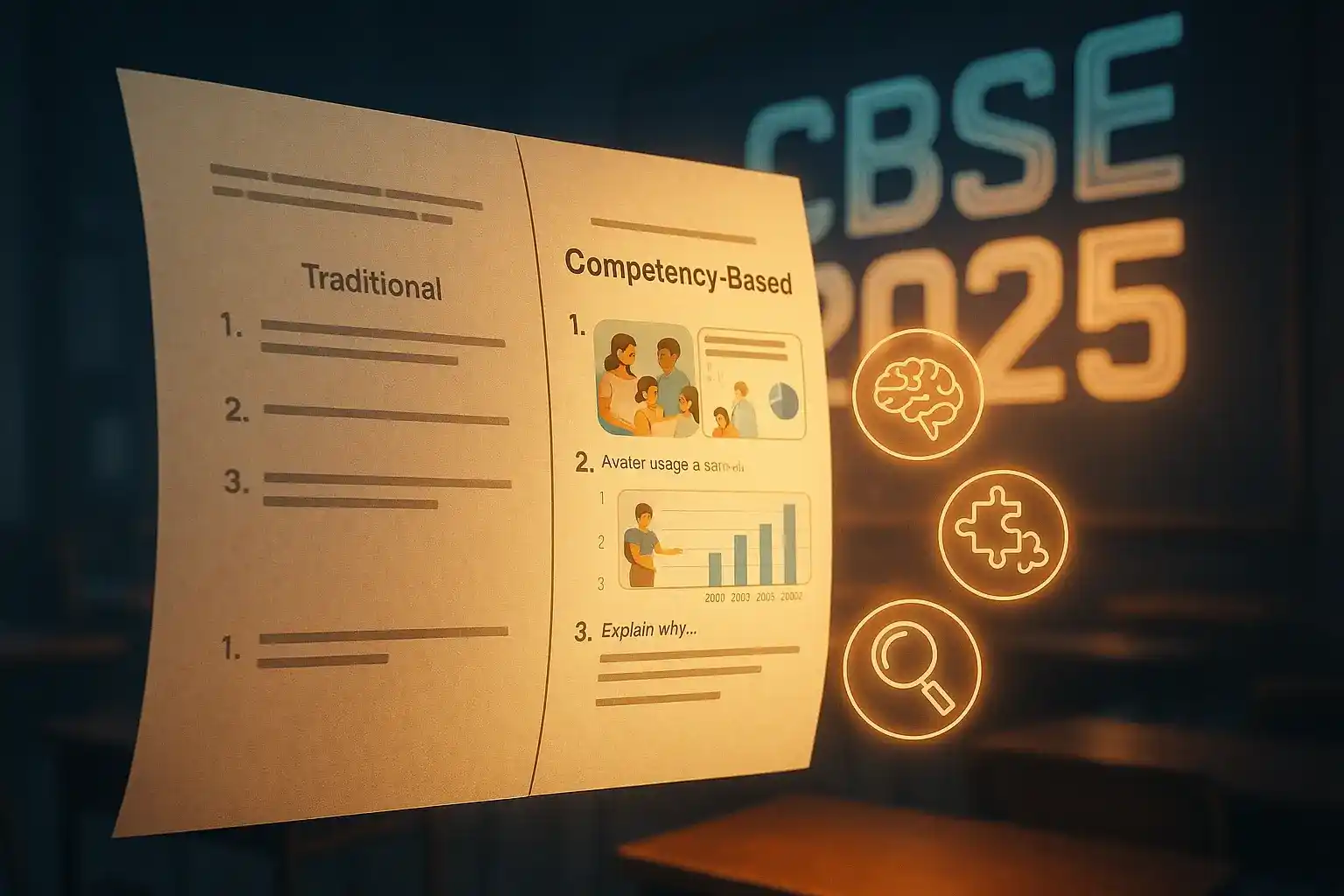How CBSE’s new question format is reshaping exam prep in 2025
Competency-based questions are transforming CBSE exams. This blog explains what they are, why they matter, and how students and parents can prepare effectively for 2025.

The Central Board of Secondary Education (CBSE) has steadily been moving toward competency-based education, and in 2025, this shift becomes more visible than ever. Students sitting for board exams will face more questions that test application, reasoning, and problem-solving rather than rote memorization. For both students and parents, understanding this change is essential to preparing effectively and staying confident in the new exam environment.
Competency-based questions are designed to test whether students can apply their knowledge in real-life or unfamiliar situations. Instead of asking direct definitions or repetitive questions from textbooks, they challenge students to think critically and demonstrate understanding. For example, rather than asking students to write Newton’s Second Law, a question might describe a real-life scenario involving a moving car and ask the student to apply the law to explain the motion.
The move toward competency-based questions is part of the National Education Policy (NEP) 2020, which emphasizes critical thinking, creativity, and problem-solving. CBSE wants students to shift away from rote learning and develop skills that are valuable beyond exams. By 2025, 50 percent of the paper in many subjects will include competency-based or application-driven questions, ensuring that students learn how to think, not just memorize.
Competency-based questions appear in different formats. Students preparing for 2025 exams should be aware of these:
Case-based questions that present a real-world situation and ask analysis-based answers
Data interpretation questions involving charts, tables, or graphs
Assertion and reasoning questions that test logic and conceptual clarity
Short answer application-based questions that need explanation in context
Traditional questions often ask students to reproduce textbook content, while competency-based questions demand understanding, analysis, and explanation. For example, a traditional question might ask for the definition of democracy. A competency-based question might present a scenario of two countries with different political systems and ask the student to identify which is more democratic and why. This change means students can no longer rely on rote learning—they need to truly grasp the concepts.
To perform well in competency-based questions, students must build more than just subject knowledge. They need:
Critical thinking to analyze situations logically
Problem-solving skills to apply formulas or rules in new contexts
Reading comprehension to carefully interpret case studies and long questions
Clear expression to write answers concisely while demonstrating reasoning
Instead of directly asking for Ohm’s Law, a Science question might provide a circuit diagram with varying resistors and ask students to calculate the current and explain how resistance impacts the flow. This requires understanding, not just memorization.
Instead of asking to list features of federalism, a Social Science competency-based question might describe two countries with different governance models and ask students to compare them using features of federalism. Students must analyze and apply the concept to new information.
Adapting to competency-based questions requires a shift in study habits. Students should:
Read NCERT textbooks deeply, focusing on understanding rather than memorizing
Practice case-based and data-based questions from sample papers
Use past year questions that have been updated with competency formats
Focus on writing practice to learn how to present logical, structured answers
Students can also benefit from digital learning tools like quizzes, flashcards, and mock exams that emphasize application and reasoning. Platforms like Edzy provide gamified practice that helps strengthen these skills daily.
Parents can play a vital role by encouraging understanding instead of pushing for rote memorization. Some useful ways to help include:
Asking children to explain concepts in their own words
Discussing real-world examples of Science and Social Science topics
Providing resources like newspapers or educational shows to improve comprehension
Motivating students to attempt sample competency-based papers
The shift toward competency-based questions marks a positive step for CBSE education. While it may feel challenging at first, it ensures students are prepared for higher studies and real-world problem-solving. By focusing on understanding, critical thinking, and practice, students can confidently tackle the 2025 exams. For parents and students, the key is to embrace this change and build study routines that strengthen skills—not just memory.
Competency-based questions are not harder—they are smarter. With the right preparation, every student can master them.

How to Prepare for the New CBSE Competency-Based Question Format
Mastering the new CBSE exam format for better academic performance

CBSE Question Paper Analysis: Trends You Must Know for 2025 Exams
Unlocking the secrets of CBSE question papers for smarter exam preparation

Top 10 Mistakes Students Make During Board Exam Preparation
Learn how to avoid common pitfalls in board exam preparation

CBSE Science Practical Exams: The Complete Student Guide
Master your CBSE Science practical exams with confidence and skill.